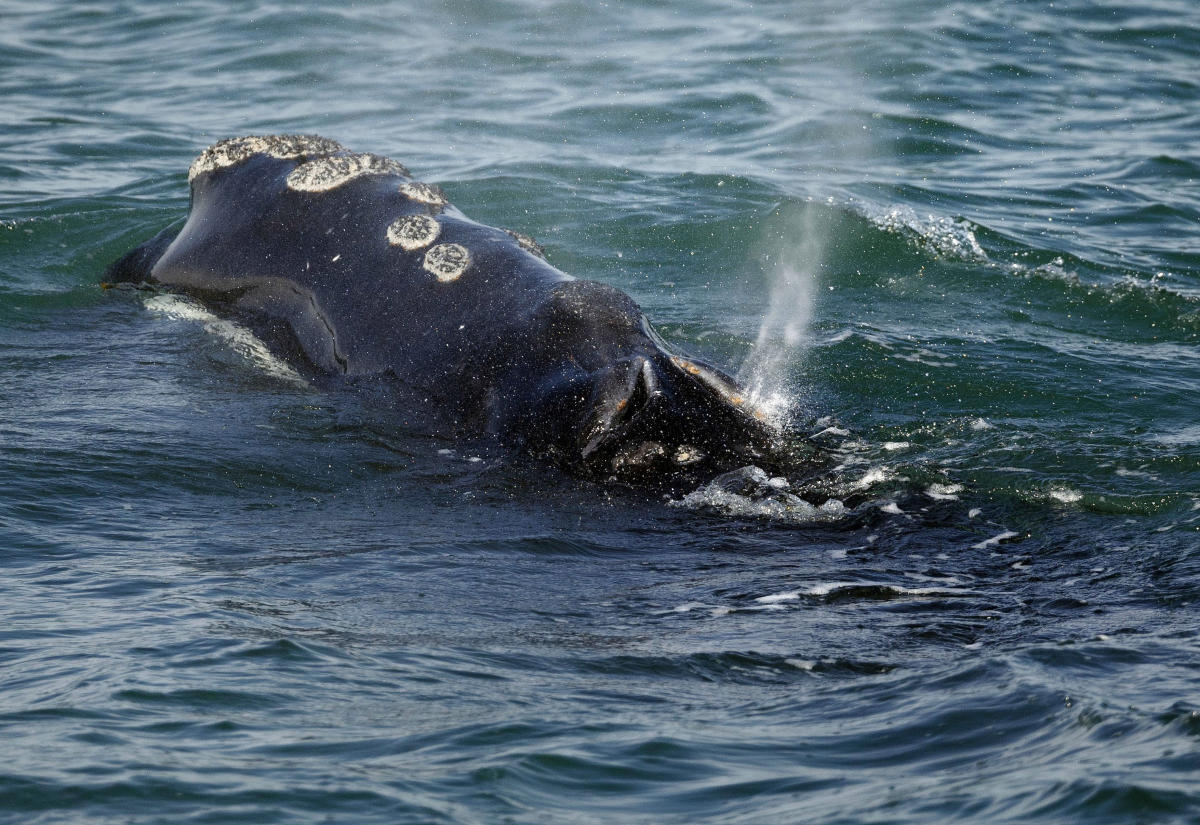PORTLAND, Maine (AP) — The decline of one of the rarest whales in the world appears to be slowing, but scientists warn the giant mammals still face existential threats from warming oceans, ship collisions, and entanglement in fishing gear.
The population of North Atlantic right whales, which live off the U.S. East Coast, fell by about 25% from 2010 to 2020 and was down to only about 364 whales as of 2021. Now, according to a group of scientists, industry members, and government officials who study them, the whales are at around 356 in total.
This suggests the population is potentially leveling off, as equal numbers of whales could be entering the population as are being killed, the North Atlantic Right Whale Consortium said Monday. However, there are certain ranges of error when it comes to accurately counting these aquatic creatures, which means estimates for 2021 and 2022 are roughly around the same number.
The whales were buoyed by a strong birthing year in 2021, with 18 calves born into the population, the consortium said. However, consortium members cautioned that the high mortality faced by the whales from collisions and entanglement remains an unsustainable burden.
“The news is less bad than it has been. My heart is a little less heavy, but certainly not light or hopeful,” said Philip Hamilton, a consortium board member and a senior scientist at the Anderson Cabot Center for Ocean Life at the New England Aquarium. “It shouldn’t be dependent on the whales to give birth to enough calves to reverse what we’re doing to them.”
Tangled up in nets and heavy ropes, the gentle giants can drown when they’re unable to reach the surface or suffer grievous, life-threatening injuries.
Once numerous, their populations were decimated during the commercial whaling era. They have been federally protected for decades.
Scientists say one reason the whales are now in decline has to do with warming oceans and climate change. These whales, which can weigh well over 100,000 pounds (45,359 kilograms), sustain themselves by eating tiny ocean organisms called copepods. Every year, they journey from their calving grounds off Florida and Georgia to feeding grounds off New England and Canada.
As waters have warmed, the whales must venture outside protected areas of the ocean in search of food. This leaves them vulnerable to collisions with large ships and getting trapped in commercial fishing gear, which are the leading causes of their early mortality.
Proposed fishing restrictions aimed at protecting the whales have met opposition from numerous lobster fishermen who fear it would put them out of business. Dave Cousens, a past president of the Maine Lobstermen’s Association, has called the proposed rules “nonsensical.”
Conservationists advocate for new rules to protect the whales, and federal authorities have stated they expect to take final action on a proposed vessel speed rule this year. Proposed new fishing laws are also being developed but have resulted in a lengthy court battle.
“There is still hope for the species. Things are dire, that is true. But with the right things in place, like adjustments to the speed rule, there is still hope for the future,” said Katie Moore, deputy vice president for animal rescue with the International Fund for Animal Welfare.
Janet Coit, the assistant administrator of the National Marine Fisheries Service, announced the launch of a new tool on their website last week. This tool allows the agency to monitor and share the effectiveness of speed regulations in reducing the threat of ship collisions. Coit stated that this is part of the government’s plan to “monitor the effectiveness of conservation efforts” to save the whales.
The right whale consortium emphasized that sublethal injuries from collisions and fishing gear also pose a significant concern for the remaining whale population, as severely injured or sick whales are less likely to reproduce.


